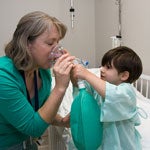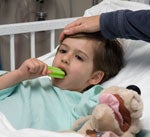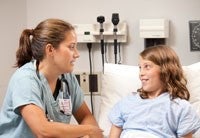Preparing Your Child for Surgery
What is surgery and why is it important?
Many children need to have surgery, also called an operation. But what does this mean and why is it important?
On this page, you will find information to share with your child about having surgery, written in terms Child Life Specialists believe children can easily understand.

How to Explain Surgery to Kids
There are many common surgeries for children.
- Sometimes children have surgery to put special tubes in their ears to prevent ear infections and to help them hear better.
- Sometimes children are born with a body part that did not grow right or does not work well and the doctor can make it better with surgery.â€&hibar;
- Children who have sore throats over and over again will need to have their tonsils removed.
- Other times children might be hurt in an accident and the doctor will help a bone or body part heal better with surgery.
When people have an operation, they will need a kind of medicine called anesthesia. Anesthesia is medicine that gives kids and grown-ups a "medicine sleep" They cannot feel anything at all. They don't even dream.â€&hibar; When the surgery is finished the doctor stops giving the medicine and the person wakes up.
Things to Do Before Your Surgery
- Please be sure to ask the doctor or nurses any questions you have about your surgery.
- Remember to follow all of the instructions for the day of surgery like not eating or drinking anything after midnight. You get to drink some apple juice or eat a Popsicle after your surgery is over.
- Think of things you can do to help you stay relaxed or less nervous about having surgery. Did you know that when your body is relaxed, you body heals better?
Things to Do the Day of a Planned Surgery
- Bring a stuffed animal or blanket with you.
- Take big, deep breaths.
- Think of your favorite things or a special place.
- Hold a loved one's hand.
- Remember you are having surgery to help your body feel better and be healthier.
The surgery center is a very busy place where you will see lots of doctors and nurses taking care of other kids and grown-ups who need to have an operation just like you. They will be wearing "scrubs" or hospital clothes, and some doctors and nurses will have on cool, colorful "doctor" hats.â€&hibar;You will get to wear a "doctor" hat too.
What happens on a typical day of surgery?
- On the day of your surgery, you will arrive at Patient Registration where you will speak with the receptionist and let her know that you have arrived.
- Next, you will be directed to the pre-op area. This is where you get ready for surgery. You will change into hospital pajamas and meet the people who will help with your surgery.
- The nurses and doctors taking care of you will check your temperature and listen to your heart beat and breathing. They will talk with your parents and ask a lot of questions about your health.

- You will meet a child life specialist who can teach you more about your surgery and everything that will happen and talk to you about ways to stay relaxed or feel less nervous. She also has games and activities.
- While you are waiting for surgery you can watch TV, play in the playroom, play a video game, color and draw or play a board game.
- You can alsoâ€&hibar;bring your device, so you can listen to music before your surgery.
- If you are about 10 years old or younger you will probably drink some relaxing medicine before you go to the operating room.â€&hibar;
- If you are older than 10 years old, you get this medicine through your IV that will be started in the pre-op area. We use numbing medicines to help make getting an IV easier.
- A stuffed animal or special comfort item can go with you to the operating room.
- When it is time for surgery, you will get to give hugs and kisses and say "see you soon" to your loved ones.
- Nurses who work in the operating room will roll you on your bed to the operating room and stay with you the whole time you are having surgery.
- When the surgery is over, the doctor will speak to your family about your surgery and thenâ€&hibar;two family membersâ€&hibar;will meet you in the recovery room.
- You will usually spend about one hour in the recovery room while the sleeping medicine or anesthesia wears off a little bit.
- Depending on the type of surgery, you may go home the same day or spend a night or several days in the pediatric unit.â€&hibar;A family member can stay with you in your hospital room if you stay.
A Note for Parents
 It can be helpful for your child to bring a security object with them, such as a pacifier, favorite stuffed animal, blanket or a special toy.
It can be helpful for your child to bring a security object with them, such as a pacifier, favorite stuffed animal, blanket or a special toy.
Older children may want to bring a book or other distraction.
If your child uses a bottle or special cup, please bring it with you for your child in the recovery room.
An anesthesiologist will discuss your child's plan of care with you. Most children and teenagers having surgery receive general anesthesia. This means that they will sleep very deeply during the operation.
Generally, for younger children, anesthesia is given with a mask since they tend to have a more difficult time with needles. In the operating room, your child will gently breathe in the anesthetic medicines until asleep. After your child is asleep, an IV is inserted to give fluids and any additional drugs.
For older children and teenagers, the IV is started in the pre-op area, and the anesthesia is given through the IV once in the operating room. We have different forms of numbing medicine to help when getting the IV started.
Please be sure to make alternative plans for brothers and sisters. Outpatient surgery can be stressful for parents and children. We recommend you bring only the child who is having surgery to the Day Surgery Center. This will allow you to direct your full attention to him or her.
Additional Resources for Children and Teens
Twinkle Goes to the Hospital: Coloring pages to download and print out for your child.
Families First: Healthy articles, tips & education for families!